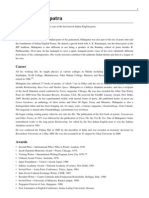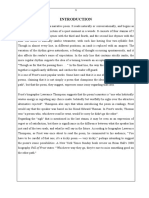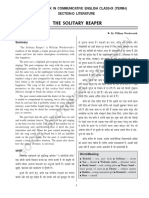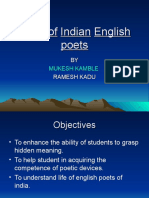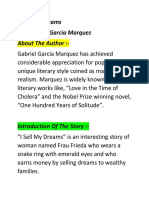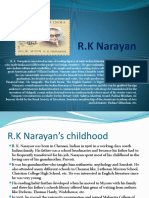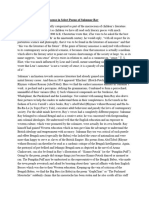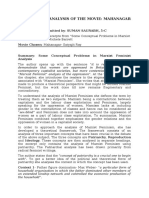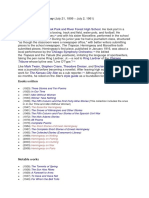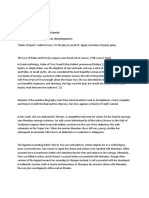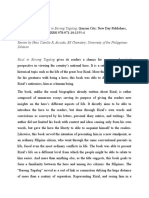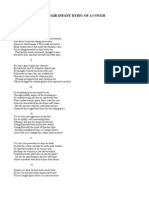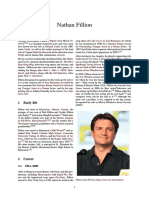Ruskin Bond
Ruskin Bond
Uploaded by
Risheet JhaCopyright:
Available Formats
Ruskin Bond
Ruskin Bond
Uploaded by
Risheet JhaOriginal Title
Copyright
Available Formats
Share this document
Did you find this document useful?
Is this content inappropriate?
Copyright:
Available Formats
Ruskin Bond
Ruskin Bond
Uploaded by
Risheet JhaCopyright:
Available Formats
Ruskin Bond (born 19 May 1934).
He was awarded the Sahitya Academy Award in
1992 for Our Trees Still Grow in Dehra, his novel in English. He was awarded
the Padma Shri in 1999 and the Padma Bhushan in 2014.[1]
EDUCATION
Ruskin's father joined the Royal Air Force in 1939 and Ruskin along with his mother
and sister went to live at his maternal home at Dehradun.
Shortly after that he was sent to a boarding school in Mussourie. When Bond was
eight years old, his mother separated from his father and married a Punjabi Hindu,
Hari. His father arranged for Ruskin to be brought to New Delhi where he was
posted. He was very close to his father and describes this period with his father as
one of the happiest times of his life. When he was ten, his father died of malaria,
while he was posted in Calcutta. Ruskin was at his boarding school in Shimla and
was informed about this tragedy by his teacher. He was thoroughly heartbroken.
Later, he was raised by his mother and stepfather who lived in Dehradun.
He did his schooling from Bishop Cotton School in Shimla, from where he graduated
in 1950. He won several writing competitions in the school including the Irwin Divinity
Prize and the Hailey Literature Prize. He wrote one of his first short stories,
"Untouchable", at the age of sixteen in 1951.
Following his high school education he went to his aunt's home in the Channel
Islands (U.K.) in 1951 for better prospects and stayed there for two years. In London,
he started writing his first novel, The Room on the Roof, the semi-autobiographical
story of the orphaned Anglo-Indian boy named Rusty; he did various jobs for a living.
It won the John Llewellyn Rhys Prize, (1957) awarded to a British Commonwealth
writer under 30. He moved to London and worked in a photo studio while searching
for a publisher. After getting it published, Bond used the advance money to pay the
sea passage to Bombay and settle in Dehradun.[4]
BOOKS WRITTEN
The Room on the Roof
2 The Blue Umbrella
3 Time Stops at Shamli Ruskin Bond
4 Roads to Mussoorie
5 The Night Train at Deoli and Other Stories
6 Rain in the Mountains: Notes from the Himalayas
7 Our Trees Still Grow in Dehra
8 A Book of Simple Living
9 Lone Fox Dancing: My Autobiography
10 Getting Granny's Glasses
Five notable works
1 .The room on the roof
2. Our trees still grow in Dehra
3. The blue umbrella
4. A flight of pigeons
5. The night train at Deoli
6.A Handful of Nuts
7. Rusty, the Boy from the Hills
QUOTES
1 “and when all the wars are over, a butterfly will still be beautiful.”
2 “To be able to laugh and to be merciful are the only things that make man better than the beast”
3 “People often ask me why my style is so simple. It is, in fact, deceptively simple, for no two sentences are
alike. It is clarity that I am striving to attain, not simplicity.
Of course, some people want literature to be difficult and there are writers who like to make their readers
toil and sweat. They hope to be taken more seriously that way. I have always tried to achieve a prose that is
easy and conversational. And those who think this is simple should try it for themselves.”
You might also like
- Michael Madhusudan DuttDocument9 pagesMichael Madhusudan DuttGreen LightNo ratings yet
- Essence of Shillong in Anjum Hasan'sDocument12 pagesEssence of Shillong in Anjum Hasan'sChakraborty Kanika100% (1)
- Bragg Emergency Response - TeachersDocument15 pagesBragg Emergency Response - TeachersWaitra100% (1)
- Teenagers Women Pocket Face Mask Template Rev3 PDFDocument2 pagesTeenagers Women Pocket Face Mask Template Rev3 PDFManuelaNo ratings yet
- Bhola Grandpa and The TigerDocument2 pagesBhola Grandpa and The Tigerakd41841No ratings yet
- Swami and Friends LitChartDocument42 pagesSwami and Friends LitChartsheshadrisrivastav3No ratings yet
- Sukumar Ray BiographyDocument2 pagesSukumar Ray BiographyPartha Pratim PalNo ratings yet
- Question Bank Department of English 15022020Document116 pagesQuestion Bank Department of English 15022020sabbomirza377No ratings yet
- Book ReviewDocument5 pagesBook ReviewMANOHAR SIVVALA 20111632100% (1)
- Principal Nondetailed Essay The Meeting PoolDocument7 pagesPrincipal Nondetailed Essay The Meeting PoolSesha Sai Kumar0% (1)
- Chapter1 6, No 6Document224 pagesChapter1 6, No 6Ravi SharmaNo ratings yet
- An Analysis of The PoemDocument2 pagesAn Analysis of The PoemDayanand Gowda Kr100% (2)
- Mark of VishnuDocument17 pagesMark of VishnuKamalakkannan MuniappanNo ratings yet
- My Grandmother's House PDFDocument1 pageMy Grandmother's House PDFSahifa AslamNo ratings yet
- Jayanta MahapatraDocument6 pagesJayanta MahapatraNHNo ratings yet
- Lets Go HomeDocument21 pagesLets Go Homeshetty100% (1)
- Bond Titles Short StoriesDocument4 pagesBond Titles Short StoriesBalaji Vembu100% (1)
- My Early InfluencesDocument2 pagesMy Early InfluencesIruthaya SanthoseNo ratings yet
- D2. Julius CaesarDocument5 pagesD2. Julius CaesarLavenderNo ratings yet
- Eng 3Document10 pagesEng 3ArpitNo ratings yet
- The Road Not TakenDocument26 pagesThe Road Not TakenbasheerNo ratings yet
- Ruskin BondDocument2 pagesRuskin Bondhoney1002No ratings yet
- Madhyamik/Higher Secondary English Grammar For 2015 Prepared by Taibur Rahaman (B.Ed, M.A in English, B.A in English)Document19 pagesMadhyamik/Higher Secondary English Grammar For 2015 Prepared by Taibur Rahaman (B.Ed, M.A in English, B.A in English)Taibur RahamanNo ratings yet
- Lec-5 - The Elizabethan Sonnet SequenceDocument3 pagesLec-5 - The Elizabethan Sonnet Sequencekamran khan100% (1)
- Maneater of Malgudi: Submitted To: Dr. Manoj Kumar Submitted By: Koysha Katiyar B.A. - (H) - ENGLISH/SEM 3Document7 pagesManeater of Malgudi: Submitted To: Dr. Manoj Kumar Submitted By: Koysha Katiyar B.A. - (H) - ENGLISH/SEM 3Koysha Katiyar100% (1)
- Goyal Brothers Prakashan: The Solitary ReaperDocument7 pagesGoyal Brothers Prakashan: The Solitary ReaperSTANLEY RAYEN100% (1)
- My DaysDocument1 pageMy DaysGokul RamachandiranNo ratings yet
- The Legacy of Derozio, A Messiah of Bengal Renaissance: SamitkarDocument9 pagesThe Legacy of Derozio, A Messiah of Bengal Renaissance: SamitkarLuminaNo ratings yet
- Study of Indian English PoetsDocument11 pagesStudy of Indian English PoetsPranjalGoelNo ratings yet
- I Sell My Dreams By: Gabriel Garcia Marquez About The AuthorDocument12 pagesI Sell My Dreams By: Gabriel Garcia Marquez About The AuthorSohan PrajapafNo ratings yet
- Birches: Subject: EnglishDocument5 pagesBirches: Subject: EnglishspandeysirNo ratings yet
- Prem ChandDocument15 pagesPrem ChandAshwini Kumar Chaudhary100% (2)
- The Strange Affair of Robin NgangomDocument11 pagesThe Strange Affair of Robin NgangomManya Suri100% (1)
- Swami and Friends.2Document1 pageSwami and Friends.2AkhilTCNo ratings yet
- The Portrait of A Lady - NotesDocument5 pagesThe Portrait of A Lady - NotesQudsiyah AdvaniNo ratings yet
- Mahasweta DeviDocument5 pagesMahasweta DeviNHNo ratings yet
- Uphesc English SyllabusDocument4 pagesUphesc English SyllabusLet's Be The DifferenceNo ratings yet
- Tughlaq - : by Girish KarnadDocument15 pagesTughlaq - : by Girish KarnadRaj Bala100% (1)
- This Is The Analysis of The Poem The Palanquin Bearers by Sarojini NaiduDocument10 pagesThis Is The Analysis of The Poem The Palanquin Bearers by Sarojini NaiduSudhakar P M Striver0% (3)
- Look East Policy and Act East Policy - A ComparisonDocument6 pagesLook East Policy and Act East Policy - A Comparisontiara kunderNo ratings yet
- Chippy - R K NarayanDocument2 pagesChippy - R K NarayanAami Ke100% (2)
- The Story Line / Plot SummaryDocument2 pagesThe Story Line / Plot SummaryMohd Yousha Ansari100% (1)
- R.K NarayanDocument6 pagesR.K NarayanPrithwijit SanyalNo ratings yet
- Analysis of Gulli DandaDocument2 pagesAnalysis of Gulli DandaNaman Mishra100% (1)
- Abol Tabol Nonsense LiteratureDocument4 pagesAbol Tabol Nonsense Literaturearoychowdhury30No ratings yet
- Summary of Sonnet 23: SpeakerDocument5 pagesSummary of Sonnet 23: SpeakershettyNo ratings yet
- "Dream Children - A Reverie" by Charles LambDocument4 pages"Dream Children - A Reverie" by Charles LambDaleep Kumar100% (1)
- A Critical Analysis of Mahasweta Devi WritingDocument13 pagesA Critical Analysis of Mahasweta Devi WritingSamyak JainNo ratings yet
- Rani Lakshmibai - Wikipedia, The Free EncyclopediaDocument2 pagesRani Lakshmibai - Wikipedia, The Free EncyclopediaBoss SivaNo ratings yet
- Selvi PDFDocument8 pagesSelvi PDFumdb2205No ratings yet
- English Paper IIIDocument52 pagesEnglish Paper IIIGuruKPONo ratings yet
- A ShadowDocument7 pagesA ShadowHardik Raheja100% (1)
- Patriarcal Analysis of The Movie: MahanagarDocument4 pagesPatriarcal Analysis of The Movie: MahanagarSuman SaurabhNo ratings yet
- 10 - Chapter 3 PDFDocument37 pages10 - Chapter 3 PDFAbhay HariNo ratings yet
- 1 1 4 5 19Document56 pages1 1 4 5 19Avinash100% (1)
- A Roadside Stand - PPTDocument14 pagesA Roadside Stand - PPTAdone AssociatesNo ratings yet
- At The Lahore Karhai SummaryDocument1 pageAt The Lahore Karhai SummarySukanya KichuNo ratings yet
- The Indian Emperor: "Boldness is a mask for fear, however great."From EverandThe Indian Emperor: "Boldness is a mask for fear, however great."No ratings yet
- (Two Hours) : Geography H.C.G. - Paper - 2Document9 pages(Two Hours) : Geography H.C.G. - Paper - 2Risheet JhaNo ratings yet
- ICSE 10 History Growth of Nationalism 20 Marks 30.4.2020Document1 pageICSE 10 History Growth of Nationalism 20 Marks 30.4.2020Risheet JhaNo ratings yet
- Tsunami EssayDocument1 pageTsunami EssayRisheet JhaNo ratings yet
- Oak Park and River Forest High School: Books WrittenDocument2 pagesOak Park and River Forest High School: Books WrittenRisheet JhaNo ratings yet
- Google Drive Computer Risheet FolderDocument4 pagesGoogle Drive Computer Risheet FolderRisheet JhaNo ratings yet
- English Vocabulary Booster: HealthDocument2 pagesEnglish Vocabulary Booster: HealthPháp Sư Giấu MặtNo ratings yet
- Helen of TroyDocument30 pagesHelen of TroyZenmaNo ratings yet
- Manual de Configuración y Comisionamiento OptiX RTNDocument38 pagesManual de Configuración y Comisionamiento OptiX RTNJonathan Gonzalez.LNo ratings yet
- Book Review: Review by Nina Camille R. Alcaide, BS Chemistry, University of The Philippines-DilimanDocument7 pagesBook Review: Review by Nina Camille R. Alcaide, BS Chemistry, University of The Philippines-DilimanNina Camille AlcaideNo ratings yet
- Dos and Don'ts of Making A Poster PresentationDocument25 pagesDos and Don'ts of Making A Poster Presentationvikas upadhyayNo ratings yet
- Archaeological DiggingsDocument32 pagesArchaeological Diggingsmohitpadalia100% (2)
- Re05-Result-For Dv-Gd-Interview-Am-Architect PDFDocument1 pageRe05-Result-For Dv-Gd-Interview-Am-Architect PDFCivil Site 17No ratings yet
- The Handmaids Tale ContextDocument1 pageThe Handmaids Tale ContextmanmalNo ratings yet
- The Renovation of The BodyDocument5 pagesThe Renovation of The BodyjlbNo ratings yet
- 030 BULLY BILL Free Childrens Book by Monkey PenDocument24 pages030 BULLY BILL Free Childrens Book by Monkey PenMaynor MaynorNo ratings yet
- The Subject and Elements of ArtDocument5 pagesThe Subject and Elements of Artcherry shane abanesNo ratings yet
- Death FaDocument2 pagesDeath FaParvez AhamedNo ratings yet
- Topic: 3 Days 2 Nights Trip of KedahDocument17 pagesTopic: 3 Days 2 Nights Trip of KedahJia LihNo ratings yet
- Pathfinder - Kingmaker - Harrim Build - NeoseekerDocument4 pagesPathfinder - Kingmaker - Harrim Build - NeoseekerBruno Sergio Oliveira FerreiraNo ratings yet
- Sharjah Supplement 2017Document24 pagesSharjah Supplement 2017Publishers WeeklyNo ratings yet
- 10 ĐỀ SPEAKING PART 2 THI NHIỀU NHẤTDocument37 pages10 ĐỀ SPEAKING PART 2 THI NHIỀU NHẤTkatieNo ratings yet
- Ben Jonson 2018Document40 pagesBen Jonson 2018Victoria ColesnicNo ratings yet
- Nathan Fillion: 1 Early LifeDocument8 pagesNathan Fillion: 1 Early LifeBibiiiNo ratings yet
- Pearson Edexcel Level 3 Advanced GCE in Music 9MU0 SpecificationDocument118 pagesPearson Edexcel Level 3 Advanced GCE in Music 9MU0 Specificationmusicguy joeNo ratings yet
- Best BooksDocument4 pagesBest BooksCreciun Virginia100% (1)
- Using Cmap ToolsDocument120 pagesUsing Cmap ToolsPedro NumpaqueNo ratings yet
- Operatiosn Report 1Document68 pagesOperatiosn Report 1Jan Carlo NavarroNo ratings yet
- 94 Book 1 Part B Prepositions After Verbs (Intermediate / Upper-Intermediate)Document1 page94 Book 1 Part B Prepositions After Verbs (Intermediate / Upper-Intermediate)Tornike IzoriaNo ratings yet
- San Te: 1 External LinksDocument2 pagesSan Te: 1 External LinksNupur PalNo ratings yet
- To My Daughter, 1954: at The San Francisco AirportDocument5 pagesTo My Daughter, 1954: at The San Francisco AirportPaulinaOdeth RothNo ratings yet
- Plastic Material Used in TrucksDocument22 pagesPlastic Material Used in TrucksnishantNo ratings yet
- List of Important Old Testament Manuscripts-2ppDocument2 pagesList of Important Old Testament Manuscripts-2ppAlmir Macario BarrosNo ratings yet
- Walter Pater Conclusion To Studies in The RenaissanceDocument2 pagesWalter Pater Conclusion To Studies in The RenaissanceAndra AndraNo ratings yet
















